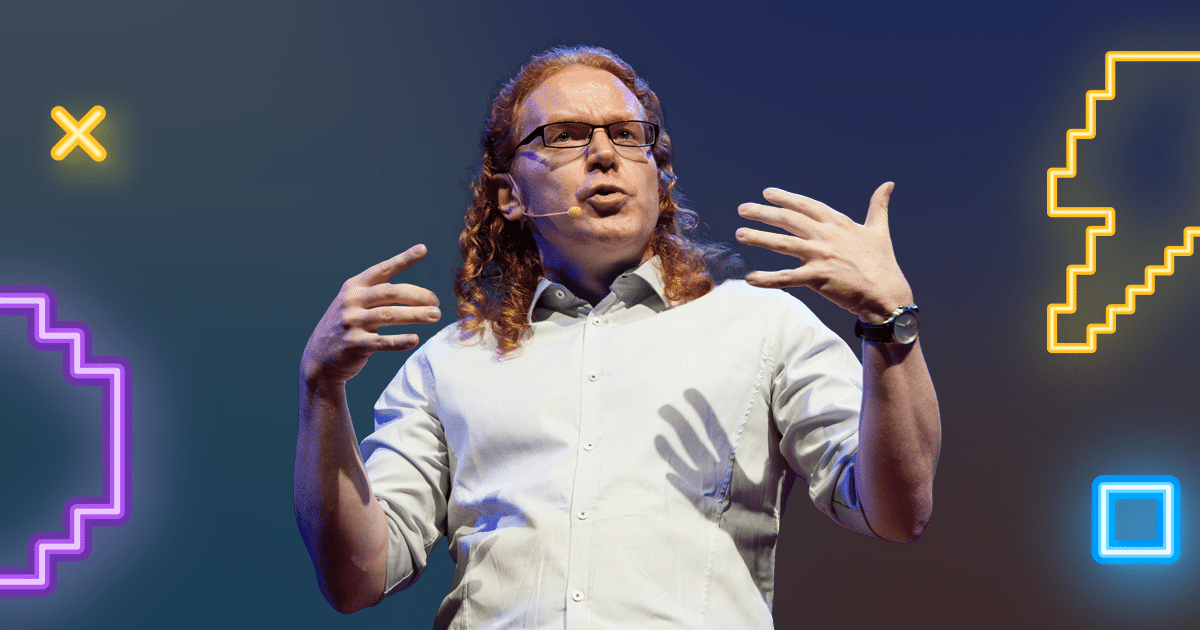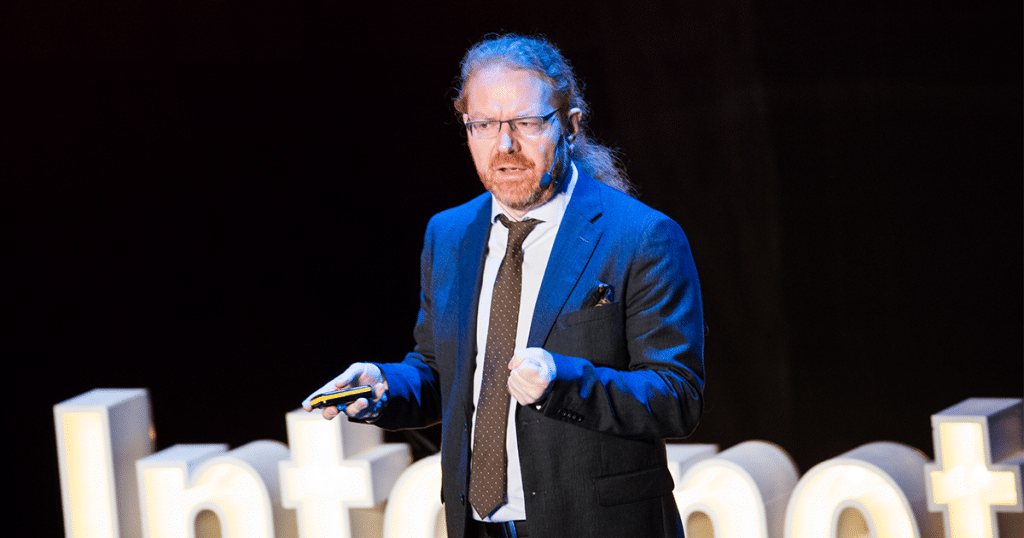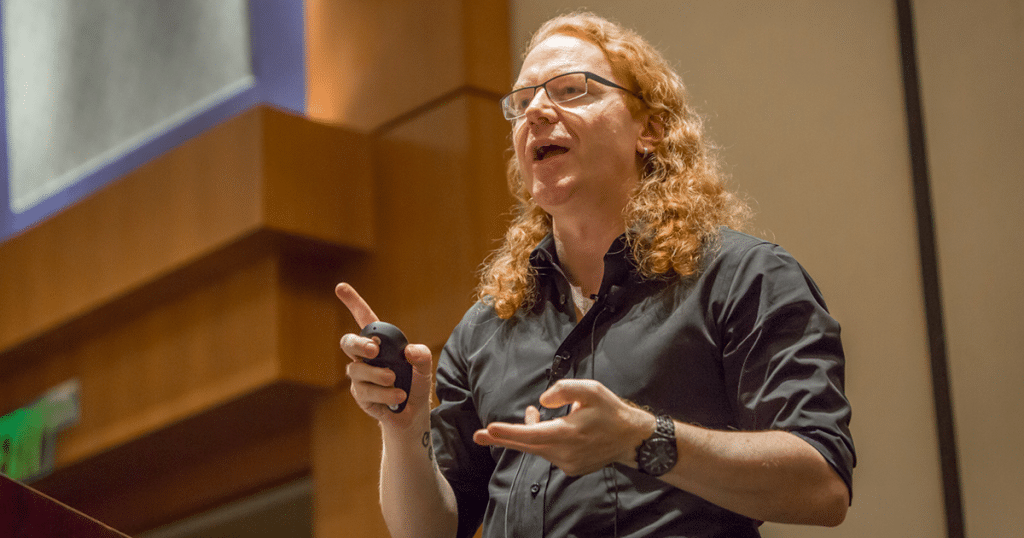On UX and AI, being laid off from big tech and developer evangelism with Christian Heilmann


I’ve always seen computers as a tool to do boring things for me as a human. In school, I wrote a program to solve my Math homework and donated it to the school library, says Christian Heilmann, director of Developer Relations at WeAreDevelopers.
Chris is a former developer evangelist at Microsoft, Mozilla, and Yahoo, and an author of a handbook on developer advocacy. He recently spoke at the CityJS conference on how good AI products need good UX, otherwise, they become more of a distraction than a solution. We caught Chris to find out more about the dos and don’ts of UX in AI products, his career in developer evangelism, and how being laid off from big tech changed his perspective on developer work and the tech industry at large.
We need more simplicity, and that’s not chat systems
Tell us more about the importance of UX when it comes to developing generative AI solutions.
Christian: Right now, we are in a space where ChatGPT has been a runaway overnight success. Business people are excited about those numbers – the fastest-growing app and all. The concept of ChatGPT displaying a big language model’s outcomes in a simulated conversation was brilliant.
It showed the “natural” part of language processing and proved to be highly engaging and addictive. But we shouldn’t just copy it and shove that concept into every product. On its own, this worked. But “having a conversation” also means being fully engaged and spending a lot of time.
Lots of people right now ask a system to refine an answer in a 10-minute chat that could be a one-second search result. People aren’t good at asking the right questions. They are great at filtering and dismissing things they don’t like, though. Right now, most AI systems don’t do much with that negative feedback.
That’s a shame, as it could help us rid the big data models of “hallucinations” and repetitive results. Sadly enough, the success of any software product right now is measured the wrong way. The more users and time spent on the product, the more successful it is.
I believe that the excitement about generative AI will fade, and people will prefer practical tools over “fake creative”.
When it comes to creating and searching for information, this isn’t right. I believe a product that quickly gives me the result I need is better than the one that keeps me engaged. Web search used to be like that. When I worked at Yahoo, we buried the search box in lots of paid content. Engaging content, but in essence, noise.
Google started out and stayed a simple search box for a long time. Do one thing well, give me the results for me to choose from. That’s why they ruled the search market for ages. These days, web search is dead, as 90% of the results are ads. Or content created to be found searching for one topic but trying to redirect you to another one.
We need more simplicity. And that’s not chat systems. These always have a short time where they rock the world and then vanish into obscurity. Remember when Siri, Cortana, Alexa, and Bixby were advertised as the only way to communicate with machines? They are still around, but we don’t wake up and call Alexa to plan our day for us. We call it to set a 10-minute alarm till the pasta is ready and that’s about it.
AI is being shoe-horned into everything
How do you see the further development of solutions based on artificial intelligence?
Christian: AI is incredibly powerful and dangerous in the wrong hands. AI should be enhancing tasks we already do and making them smoother – not be the new Facebook or TikTok that keeps yelling at us to interact. I can predict that people will soon get sick of every tool telling them to create everything for them. If you think about it, we are in a pointless loop right now.
People use ChatGPT to turn three bullet points into a long, well-formed email. People receiving that email then use ChatGPT to get s summary.
If anything, these systems show us right now how redundant and formulaic some of our business communication has become. I hope that we learn from that and become more human in our conversations again. For the foreseeable future, I can see AI being shoe-horned into everything.
And many people who wrote a ChatGPT plugin call themselves a startup and product. I also see great work done, though. I have invested in a few companies, and I am a technical advisor. These are all companies that use AI under the hood to automate things people do anyway.
The biggest thing I want and work for is more transparency. Technology should be something we use and understand and not magic. That’s why there need to be a lot more open-source solutions in this space. Not easy, as AI is expensive when it comes to computational power.

An AI opportunity for local players
What would you recommend to everyone involved in the development of AI solutions for different markets?
Christian: Don’t bet on only one player. Sadly enough, a lot of AI solutions will be available only in the US, and the reason isn’t technical; it is legal. European laws do protect privacy and demand transparency. Many fast-growing solutions don’t bother with privacy. Being obscure about what your product does is seen as a market advantage. Furthermore, many products in the AI market are incredibly English-centric.
Using most of these tools in, let’s say, Polish or Czech is a massive hit-and-miss – if it is even supported. I can see an opportunity here. US companies don’t want to put in much effort to fix that because the market is too small. A local player could be the market leader. The trick is to focus on quality rather than being faster and bigger than OpenAI.
When your name is on the wrong spreadsheet
You currently work as a Director of Developer Relations at WeAreDevelopers. How did you come to this position, and what does it entail?
Christian: I spent the last 18 years working in large corporations or big web players. Specifically Yahoo, Mozilla, and Microsoft. I also worked remotely from Europe with distributed teams, most of them on the West Coast of the US. This meant that I led teams, and ran products remotely, and focused on the US market. This was great, and during the pandemic, I trained a lot of people to work remotely and efficiently.
When the market dropped, and a lot of the big players laid off thousands of people, I was one of them. Over 20 years of experience and 8 years of in-depth company experience didn’t matter. I guess my name was on the wrong spreadsheet. I’ve already lived through one crash – the dot-com crash in 2000 – and looked for a change.
I wanted to find a place to make a difference in the job market, as searching for a job was frustrating. I joined WeAreDevelopers, a smaller, Europe-based organization that still has a significant impact. I am right now building up a Developer Relations program, which I’ve done in the past for Yahoo and Mozilla. I want the company to be a place for developers to find excellent information. I also want it to be a place where developers have a chance to change and accelerate their careers.
I wanted to take a look at the bigger market and not only introspectively try to have a career inside one big player.
The way all the big ones dealt with the decline of the stock market was discouraging. Laying off lots of people without much consideration made me realize that there is a lot to be fixed.

Companies falsely claim AI can replace developers
You also wrote a handbook on developer evangelism. Can you tell us more about how the handbook came about and what it offers?
Christian: When I was in Yahoo, I hit the career ceiling. I was as high as I could as an engineer, and I didn’t want to go into people or product management. That’s when I realized that there is a missing part in our job market. A technical person translates the wants and needs of developers inside and outside the company. So, I defined this role as “Developer Evangelist.” I wrote a handbook on what developers can do to get into this role and what it means.
To be successful, you need to write clear code documentation, articles, and give good presentations. You also need to know how to train others. I found it interesting because I could combine my love for writing and speaking with my technical job. The handbook has evolved with the needs of the market and allows you to plan your job as a technical person who’s also a voice for your company.
What does developer evangelism mean from your perspective?
Christian: Over the years, the term evangelist got a bad reputation, as it smacks of religion and dogma. We use developer advocate instead now, as you are there to speak for the developers. In the past, this meant working with people inside to plan products better. You collaborate with external partners to attract developers to your company’s products.
This is still the case, but I think we are at an interesting turning point in the tech market. The time when developers were paid a lot for easy jobs is over. We’re as scrutinized as other workers, and it is time to take our jobs seriously. You can see unions for tech workers being formed. People must stand firm when companies falsely claim that AI can replace every developer.
And this is where developer advocacy also has some new and exciting challenges. Our job is not only to drive downloads and get lines of code created. We should be there for the developers to have a safe and sustainable career.
Tiring demand for explosive growth
What are your professional plans for the next period when we talk about an IT career?
Christian: Leaving Microsoft has put quite a spanner in the works for me. I’ve concentrated on a career in the place for decades to come as I thought it was big enough for that. It wasn’t. No big, publicly traded company is. I’m looking forward to what I can do here now. I love to work with a lot of other people who have been around for as long as I have to see what we can do to make our job market more mature.
I’m very bored with the demand for continuous and explosive growth. I will give a few talks about sustainability and mental health, as I think we’ve been too rushed for too long. I also very much enjoy developing for fun again. Write something small, release it, and see what people think. Having to build for millions of people in a large corporation sounds amazing, but it can also be stifling.



